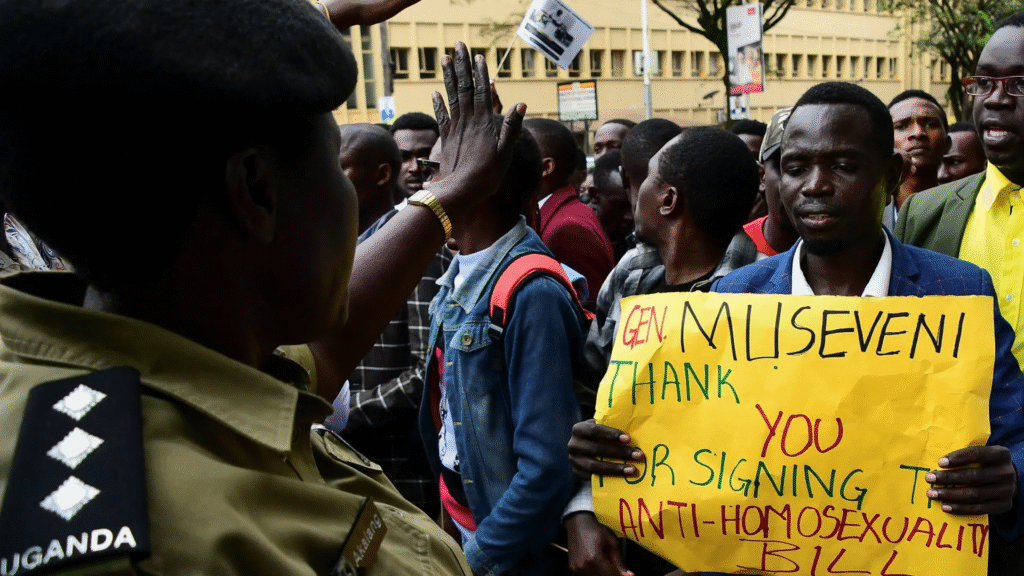Museveni on Anti-Homosexuality Law and World Bank Loan Freeze
In a interview, Ugandan President Yoweri Museveni declared that despite the World Bank halting loans due to the country’s controversial Anti-Homosexuality Act, Uganda’s economy grew by 6%.

The statement, made in an exclusive interview with RT on April 26, 2025, reflects Museveni’s defiance against Western financial institutions and their response to Uganda’s 2023 law criminalizing same-sex activities.
Museveni’s Defiant Stance
Museveni’s comment came during an interview with RT, a Russian media outlet, where he addressed Western criticism of Uganda’s Anti-Homosexuality Act, signed into law in May 2023.
The law imposes life imprisonment for same-sex acts and the death penalty for “aggravated homosexuality,” defined as cases involving minors, vulnerable people, or HIV transmission. Museveni framed the World Bank’s decision to suspend new loans as an attempt to pressure Uganda into abandoning its cultural values. He argued that Uganda’s 6% GDP growth in 2024 proved the country’s resilience, stating, “They stopped the World Bank from giving us loans, but our economy grew by 6%.”
The interview was part of Museveni’s broader narrative of resisting Western influence. He has accused international organizations of imposing their values on African nations. His remarks were aimed at both domestic audiences, to bolster national pride, and international partners, to signal Uganda’s ability to seek alternative funding from countries like China. The context reflects Museveni’s long-standing strategy of portraying himself as a defender of Ugandan sovereignty against foreign interference.
Uganda’s Economic Growth
Uganda’s economy has shown resilience despite global challenges and the World Bank’s loan freeze. According to the World Bank’s Uganda Economic Update in June 2024, the country’s real GDP growth accelerated from 5.3% in the 2022/23 fiscal year to an estimated 6% in 2023/24.
This growth was driven by diversified exports, investments in oil infrastructure, and a young, market-based economy with resources like fertile soils and oil reserves. The report projects GDP growth of 6.2% in 2024/25, with potential to exceed 7% in the medium term as oil production begins in 2025.

Despite this growth, critics argue Museveni’s claims are exaggerated. In a July 2024 article, the Daily Monitor noted that Museveni often cites inflated GDP figures, claiming Uganda’s GDP rose from $1.5 billion in 1986 to $55 billion in 2024. Analysts argue this overlooks challenges like “jobless growth,” where economic expansion fails to create sufficient employment, and persistent issues like corruption and political instability. Uganda’s economic potential remains vast, but structural challenges temper the narrative of a “miracle.”
World Bank’s Loan Suspension
The World Bank suspended new loans to Uganda in August 2023, citing the Anti-Homosexuality Act as contradictory to its values. The bank stated that the law, which imposes harsh penalties for same-sex activities, violated its commitment to non-discrimination and social inclusion. The suspension halted funding for new projects, though existing programs continued. In September 2024, the World Bank announced measures to protect LGBTQ+ individuals in ongoing Ugandan projects, but new lending remained frozen.
The decision followed international outcry, including U.S. sanctions and Uganda’s removal from the African Growth and Opportunity Act (AGOA) in January 2024. Museveni responded by accusing the World Bank of double standards, noting that other nations with similar anti-LGBTQ+ laws, like Afghanistan, continued to receive funding. To fill the gap, Uganda secured $150 million from China in November 2023 for infrastructure projects, signaling a pivot to alternative financiers.
World Bank’s Policy on Human Rights
The World Bank does not have an explicit policy tying loan approvals directly to LGBTQ+ rights, but its Environmental and Social Framework (ESF), adopted in 2016, emphasizes non-discrimination and human rights. The ESF requires projects to align with principles of inclusion and avoid harm to marginalized groups. The bank deemed Uganda’s Anti-Homosexuality Act incompatible with these standards, prompting the loan freeze.
This is not the first time the World Bank has used financial leverage to address human rights concerns. In 2005/06, it cut loans to Uganda by 10% due to governance issues, including Museveni’s removal of presidential term limits. However, critics, including Ugandan LGBTQ+ activists, argue the bank’s approach is inconsistent, as it continues funding countries with similar anti-LGBTQ+ laws. Richard Lusimbo of Convening for Equality called the bank’s mitigation measures a “facade.” The suspension reflects a broader trend of international financial institutions indirectly influencing policy through funding decisions.
Implications and Future Outlook
Museveni’s claim of 6% growth despite the World Bank’s loan freeze underscores Uganda’s economic resilience but masks deeper challenges. The pivot to Chinese loans and other non-Western partners may sustain growth in the short term, but heavy borrowing raises concerns about debt sustainability. The World Bank’s June 2024 report urged Uganda to strengthen revenue mobilization and manage debt to maintain growth.
The loan freeze has also intensified domestic and international debates. Human rights groups continue to challenge the Anti-Homosexuality Act, with Uganda’s Constitutional Court upholding it in April 2024 despite global condemnation. Museveni’s defiance may bolster his domestic support but risks alienating Western donors, potentially limiting access to concessional financing. As Uganda approaches Museveni’s 2026 election, the tension between sovereignty, human rights, and economic growth will likely shape its trajectory.
Sources: World Bank Uganda Economic Update, June 2024, Reuters, September 2024, Bloomberg, September 2024, Daily Monitor, July 2024RT interview, April 2025,Breitbart, November 2023,The Conversation, November 2023,AP News, April 2024,Yahoo News, December 2023

